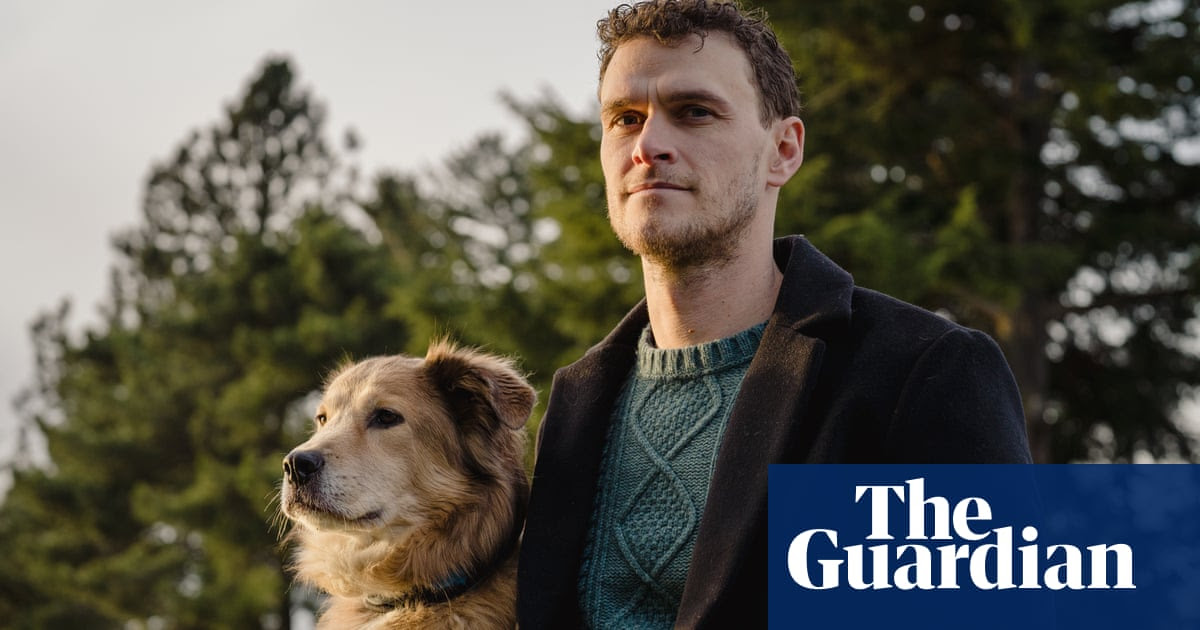The man who walked around the world: Tom Turcich on his seven-year search for the meaning of life
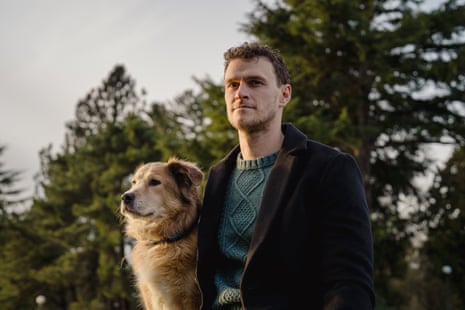
Fast friends … Tom Turcich and Savannah. Photograph: Jovelle Tamayo/The Guardian
When Turcich was 17, a close friend of his died, and he had an existential crisis. He decided it was time to seize the day – and to cross the globe on foot
At the age of 17, Tom Turcich had enjoyed a good life so far. He had wonderful parents, great friends, did well at school and was a gifted sportsman. But two things gnawed away at him: he thought he was too timid, and he was terrified of death. As a little boy, he would run down the stairs at night to check that his parents were still alive. At the age of 11, he’d lie in bed trying to simulate death so he could prepare for it. “I’d lose the sensation of my body,” he says, “and I would cover my ears and close my eyes so I couldn’t see and couldn’t hear, and I’d try to imagine what death was like. But then you can’t because you’re thinking. And there’s no thinking in death.”
Then, in 2006, his life was turned on its head. Turcich remembers every detail. He was in a car with three friends – Nick, Kevin and Fitz. Kevin was driving his father’s convertible. Back then, the boys used to hang out with a group of girls who were in the year below at school in Haddon Township, New Jersey. There was Shannon who was going out with Kevin, Ann Marie, Amanda and Jess. They’d grown up together, been friends since they were seven or eight, and they were as close as close can be.
The radio was blasting and the boys were having a good time when Kevin got a call from Shannon. He was distraught. “Kevin yelled for the music to be turned down and said, ‘Ann Marie has died.’” Sixteen-year-old Ann Marie had been killed in a jetski accident. They drove to Shannon’s house. “We sat in the front yard. There were maybe 10 of us, we were in a circle and everybody’s crying, unsure what to do. That night I lay in bed and I remember feeling this fog. It lasted about six months.”
Not only was Turcich petrified of death, he now knew he could die at any moment. Hardest of all was reconciling that it had happened to somebody like Ann Marie. “She was super-clever and exceptionally kind,” says Turcich. “Ann Marie was nice to the point it drove me crazy when I was younger because you could never get her to say anything mean. When we were hanging out I would prod her, trying to get her to say anything not generous.”
He never succeeded. Not only did Turcich lose an amazing friend, but the accident left him questioning the meaning of life, and reinforced his fear of death. In short, he had the ultimate teenage existential crisis. “I thought: if Ann Marie can die, who is definitely a better student and better person than I am, then for sure I can go at the same time. That’s why it really hit home.”
Turcich went into a decline. “It brought all those unresolved questions flooding back. I thought: OK, you’ve got to solve this problem just to go about your life.” What was the problem? “That death can come at any time – arbitrarily and instantly. It was like, with this knowledge, how do you live? What do you do? How do you integrate that fact into your life?”
He was stuck for an answer. Then one day at college, the students watched Dead Poets Society, the film about a teacher called John Keating, played by Robin Williams, who inspires his students through his love of literature. Just as the movie’s seminal speech about seizing the day – carpe diem – and living an extraordinary life had a huge impact on the students in the movie, so it also did on Turcich.
He watched the film again and again, asking himself how best he could seize the day and make his life extraordinary. It struck him for the first time that he could shape his future rather than simply let it happen to him. From then on, he did just that. He won a place in the school swimming team, performed in a one-act play, returned to playing tennis and became school champion, all the time wearing the blue “AML” bracelet his school had designed as a tribute to Ann Marie Lynch. He finally conquered his passivity when he braved his first kiss, after three (nervous) dates with a girl called Britney.
That kiss proved to be an epiphany. “It was like the birth of the universe in my head,” he says. “All of a sudden I could see all the possibilities expanding out. It finally clicked: the actions you take really can affect your life.” Turcich decided he was going to seize the day by getting out of safe, friendly Haddon Township, with its population of roughly 15,000, and seeing the world.
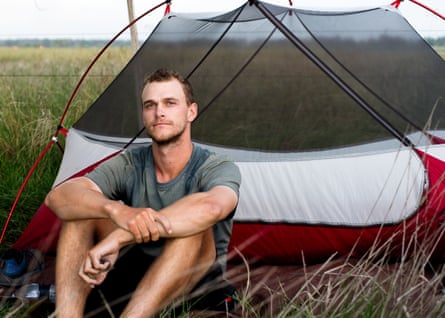
He started to make plans. He didn’t want to just see a bit of the world: if possible, he was going to see all of it. “Because the world is complex and vast, and because my general temperament is pretty timid and more towards the shy side, I wanted to be forced into adventure. The point of adventure is it’s uncomfortable and you have to grow in it.
“I had $1,000 in my bank account so I needed to find a cheap way to travel, and that led me to the guys who had walked around the world.” He read up about Steve Newman (an American who circumnavigated the globe on foot over four years in the late 1980s) and Karl Bushby (a British ex-paratrooper who set off in 1998 and is still walking today), and now he had his answer. “It seemed to solve everything I wanted out of life,” he says.
As in Dead Poets Society, the students in his class shared a deep friendship and trust. When they had to give end-of-year talks to each other, Turcich announced his plan to walk the world. His friends were “genuinely supportive” – and then he told his parents. As a young man, his father, also called Tom, had seized the day: he headed off to Hawaii at the age of 20 and spent four years spear-fishing, working on a sugarcane plantation and living under a tarp in the woods on a tiny plot of land. He met Turcich’s mother, Catherine, at the tail-end of his trip.
Tom Sr, who now runs a catering business, remembers how badly affected his son was by Ann Marie’s death. “That really threw him through a loop,” he tells me over the phone from Haddon Township. “It just turned a switch on. Ooof! Boy, if that can happen at 16 I better get living, you know. And all of a sudden, he became real.” Tom Sr thought the world walk was an inspired idea. “For me it was like, go – adventure!”
But his wife, Catherine, an artist, was less enthusiastic. What did she think when her son first mentioned the walk? “Hahahaha!” She’s got a lovely bright laugh. “I thought how naive he was. Does he actually think he’s going to walk around the world? I just thought it was a crazy idea, a passing whim.” She pauses. “But Tommy was always somebody who’d get an idea and follow it through. He stuck to a challenge.”
“She was like, ‘You’re 17 and this is just a 17-year-old’s idea,’” Turcich says. And she was right. But he wasn’t planning to act on his idea just yet. For the next few years he rarely mentioned it to anybody. He knew that many would dismiss him as fanciful at best. “I don’t like people who just talk about the things they’re going to do,” he says.
For the next eight years, Turcich quietly worked away at making it a reality. He graduated with a degree in psychology and philosophy from Moravian University in Pennsylvania, and made a living installing solar panels until he turned 25, at which point he quit and worked as a waiter in a restaurant and at an insurance firm doing data entry.
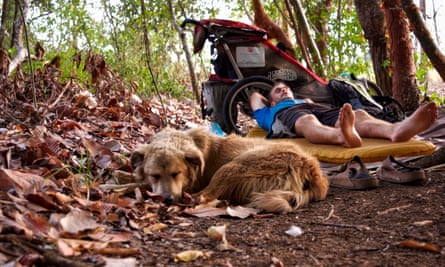
All the while, Turcich was busy making his final preparations. He would endlessly study maps, working out the best routes. Much of it depended on practicalities such as which countries insisted on a visa. He decided to walk to Argentina for the first leg of his trip. Shortly before he was due to leave he met yet another Tom, Tom Marchetty, who customised a baby buggy for his travels. The buggy would hold all his essentials – tent, sleeping bag, laptop, camera, batteries, plastic food crate (partly to hold his food, partly to insulate the smell from animals), water bottles, six pairs of socks, four pairs of underwear, a pair of trousers, a pair of shorts, long-sleeved shirt and short-sleeved shirt, wool shirt, hoodie, jacket and waterproof shoes.
Marchetty, who knew everybody in and out of town, was taken with Turcich’s plan. He called a press conference to promote the journey, with the hope of finding him a sponsor. The Philadelphia Inquirer turned up and wrote about it. The article was read by a local businessman, Bob Mehmet, who was also struck by the story and offered to sponsor the walk. “It was less than minimum wage, but it was like, I’m homeless, I don’t need much,” Turcich says. “It was more than enough to survive off throughout the walk.”
On 2 April 2015, Tom Turcich walked out of Haddon Township. At his sendoff, his father couldn’t have been more excited. “I was like, hey, go for it! Aw gee, just be careful, have a good time!” he says. “But his mother cried for months when he left.”
“I was scared for him, and I was proud of him,” Catherine says. “It was all those feelings mixed up together. I had a very hard time of it at the beginning. But he was so good at calling every Sunday. I depended on that. It was my lifeline.”
Turcich says his mother was right to be worried. “She knew how green I was. I’d grown up in this really idyllic suburb. I was just a soft idiot and a little too trusting.” He was 6ft 2in, skinny, and he’d never had to worry about his safety. He admits that he didn’t really know how to look after himself at all: “You think you’re tough, but you’re not. Now I’m a wholly different person.”
If I was heading off from home to Argentina, I say, I wouldn’t have a clue which way to turn. He must have a good sense of direction. “Luckily, there’s Google Maps now so you don’t have to worry about that too much!” he says.
Turcich spent the first two years making his way to Argentina via Colombia. In Austin, Texas, he picked up a rescue dog who had been abandoned as a puppy and named her Savannah. She became both company and security; Turcich could sleep peacefully at night knowing she was listening out for intruders. They became fast friends. And still are. As we talk over Zoom, she is lazing around in the background, taking a well-earned rest.
What does it mean to walk around the world? In a pedestrian circumnavigation, travellers must move around the globe and return to their starting point under their own power. Guinness World Records sets the requirements for a circumnavigation on foot as having travelled 18,000 miles (nearly 29,000km), and crossed four continents.
Turcich walked 21-24 miles a day for roughly half of the seven years he was away. In total, he walked 28,000 miles (and Savannah 25,000 miles), travelled through 38 countries and crossed every continent except Australia, which he couldn’t do because of lockdown restrictions. He is the 10th person to have walked the world, and he assumes Savannah is the first dog to have done so.
He believes his lack of street smarts helped him. Because he was such an innocent, he wasn’t as fearful as many of us would have been. Eleven months of the first year was spent walking and sleeping out – typically behind churches and in woods. He came across tarantulas and snakes, particularly on the palm plantations where he slept in Costa Rica.
It sounds pretty scary. “Yeah, definitely!” Did he know what to do if attacked? “No, not really. Just avoid it.” Fortunately, the tarantulas and snakes left him alone.
Occasionally, when in notoriously rough areas, he paid to spend the night indoors for fear of being mugged. “When I walked through El Salvador, it was at the peak of its highest murder rate year. It was the worst month of the worst year for murders. I saw the bodies of a husband and wife who had been executed. They’d been shot in the back of the head and were lying in a field. It made it very real.” In Mexico, disbelieving locals would ask him what he was doing, saying that even they didn’t dare walk here.
He was never attacked as such but, he says, there was a little incident in Turkey, on the Syrian border. “I was crossing a remote mountain by the border of Syria and this guy jumps off a motorcycle and points a shotgun at me. I thought I was just going to get shot and they’d take my things. But it turned out they were plain-clothed military, and they thought I was a terrorist or spy. I got detained for three hours and it was really intense, but they were really nice in the end.”
Then there was the time he was held up at knifepoint in Panama City. “I walked into this shop, and the guy was standing there with the knife pretty close to my chest. I was looking for something to defend myself with. Time was going in slow motion. But after yelling at me for a minute he took off. The guy with the knife got me away from things, while the other guy grabbed my backpack and took off.” The backpack contained all his essentials. But again, fate smiled kindly on Turcich. “I went out of the shop and there’s a crowd pointing down the alleyway, and amazingly the cops were there throwing the guy against the wall, and my backpack was lying on the ground. It had my passport in it, my computer, Savannah’s paperwork, everything. I was so lucky.”

But these were isolated incidents. He says he met so many wonderful people along the way. He was already an optimist when he set off, but by the time he returned he had even more faith in humankind, if less in some of the systems we live under. The first leg of his walk was a learning process, he says, that saw many of his preconceptions overturned. He sounds slightly embarrassed by his naivety. In Central and South America, he would walk through towns and see houses with rebars sticking off the roof. He assumed the areas must be rough or rundown because the houses were incomplete, but soon realised that the rebars were a sign of aspiration. The families were hoping to save enough money to build a second storey.
Turcich had always been taught that those who work hard will be rewarded; that if you are capable and determined there is nothing to stop you achieving. But the more he saw of the world, the more he realised this was not true. “You end up realising so little is down to willpower, because there are much smarter, much kinder people than me all over the world who don’t have my opportunities.” He tells me about a man he met in Peru selling petrol to passing trucks from his roadside hut. “He was a great guy, and very bright; definitely smarter than me, and probably a harder worker. But he’s never going to leave Peru because of the geography or history he’s born into. You see over and over again that what really affects people is the systems in place.”
To Turcich, the walk was a seven-year meditation, particularly the first two years, which were more solitary. As he walked, so much was going through his mind – his history, his values, his hopes. It all came to a head in the deserts of Peru and Chile. “I was on my own so much, just with my thoughts. The way I describe it is like weeding your garden. You don’t realise it, but your head is full of these weeds and when you’re walking, you’re on your knees pulling weeds. After about a year and a half, when I was down in south Peru, I felt like I’d thought all the thoughts, and the garden was clean. There was no more angst, no regrets, nothing I could pick through. I was in the Atacama desert, lying under a million stars, and it felt I was at the bottom of myself. All the doubts went.”
What did it feel like? “It was a hollowed-out feeling. A simple sense of existing – you’re just a small little creature in the universe. It was just peace.” It’s so moving to hear Turcich talk about his experience. At times, I feel like I’m speaking to a man who has been to the other side and witnessed things that the rest of us haven’t been privy to. There is a childlike simplicity to Turcich, but he also has a touch of the seer.
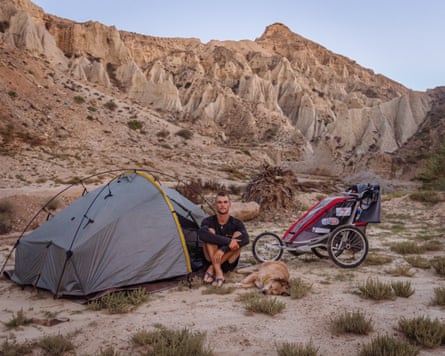
There were many days when Turcich couldn’t face walking, though Savannah was never fazed. “Sometimes I just had to walk,” he says. “It depended on time pressures and weather. If I knew there was going to be a downpour or it was going to be 100 degrees, I’d try to get to a hotel or shelter.”
Over the seven years, he returned to Haddon Township a few times. In Uruguay, he caught a terrible bacterial infection and was eventually flown home. By that time he had been travelling for more than two years. Catherine was shocked by his appearance: “He had dropped so much weight. He couldn’t hold anything down, and he was in excruciating pain.” Just recalling it upsets her. “It was very scary. He lay there on the floor, and he was so thin. It looked like he was dying.” Doctors filled him with a variety of antibiotics. Eventually one of them worked, and he returned to his travels.
The final five years of Turcich’s walk were more social than the first two. By now he felt his mind was fully open to embracing all the different experiences. He learned enough French, Russian, Turkish and Italian to ensure he didn’t feel like an eternal tourist.
“The first two years were about me and the mind. After that, it became much more about the world. I started to understand it more. I became more interested in what influences people and why countries are the way they are.” Turcich talks of the otherworldly beauty of Kyrgyzstan; the otherness of Uzbekistan, where locals had never met foreigners, there were no advertisements and American Chevrolets were the only cars on the road; the friendliness of Turkish shepherds and their huge anatolian shepherd dogs; the French countryside, where he woke up one night surrounded by 200 boars; the shaman in the Amazon who served him the psychedelic tea ayahuasca.
Egill Halldorsson, a 30-year-old Icelander, came across Turcich in Kaş, a fishing town in southern Turkey. It was 2021, and by now Turcich was six years into his walk. “I asked what he was doing,” recalls Halldorsson. “He tried to make it sound like it wasn’t a big thing, and he said he was walking across the world. My jaw dropped. I said, what? It takes you a long time to grasp just what it means.”
What were his first impressions of Turcich? “As I walked away, I said to my then girlfriend: ‘Wow, that is the most interesting guy in the world. I have to get to know him better.’ And she said: ‘Yes, but I think I sensed some sadness, or unease.’ She was referring to him being a bit lonely. Actually, tired might be a better word. Later, when I asked him, he said he’d been walking around the world all this time and as soon as he clicked with people, he’d always be saying goodbye. My girlfriend sensed he was tired of that.”
Halldorsson and Turcich stayed in Kaş for a couple of months because of the pandemic and became good friends. They would have become close whatever the circumstances, Halldorsson says. “He’s adventurous, but down to earth and fun to be around.” He seemed to have learned a lot from his travels. “He’d travelled through so many countries, met so many people. He came across as an old soul.”
During the final leg of his walk, he met a woman called Bonnie in Washington DC, echoing his father’s experience in Hawaii years before. “I stopped to write for a couple of days,” Turcich says. “We met and hit it off, and that was it.” Turcich and Bonnie, who is training to be a doctor, have been together ever since, and they now share a home in Seattle.
On 21 May 2022, seven years and 49 days after setting off, Turcich arrived back in Haddon Township. Looking back over the time, when was his happiest moment? “Crossing the finishing line.” For so long, he says, he’d thought about the day he would get home, and now it was here. “The world walk is a beautiful way to live, but it’s also really difficult and exhausting. I’d missed my family and friends so much. As I crossed the line, the primary feeling was relief – it’s over, you did it!” I assume he slept for a long time afterwards, but he laughs at the suggestion. “No, we had a huge party. It was great.”
As for his mother, Catherine, she says it was the proudest day of her life. “All the town turned out for him. There were probably 400-500 people. He came through Philadelphia and people started joining him. He had this crowd of people walking alongside him. Oh gosh! He was like the Pied Piper.”
There were bands and banners and an official finish line. “We put up an archway of balloons for him to walk through and a ribbon, and people just cheered,” Catherine says. “We were so thrilled to have him back, and he’d made it – he’d accomplished his dream. He was overwhelmed, grinning from ear to ear. Then he started crying.”
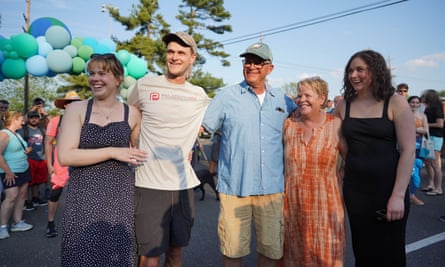
Turcich had left a callow 25-year-old, and returned a worldly-wise 32-year-old. Has it made him more confident in himself? That’s a difficult question to answer, he says. “It’s a kind of Dunning-Kruger. You know, the psychological study where the dumbest person in the room is the most confident? The more you know, the less confident you are. I think I was pretty confident at the beginning, but I was an idiot. Once you know you don’t know everything, you lose some of the confidence and become less sure about things.”
Tom Sr says his son has changed dramatically in the seven years he’s been away. “He’s a man now. He sees the world so differently. He’s been to places where people with zero money work all week to add a cinder block to their house, and they would share all they had with him. To see that is a life-changer.”
Of all the places he’s seen, Denmark is where Turcich would most like to live. “It was the first time I saw there was a different way to do infrastructure,” says Turcich. “It seemed very peaceful. I loved being able to ride my bike everywhere and not be blasted by an F-150 truck. America is very car-centric and it takes away a lot from cities and daily life.” Denmark has got its priorities right, he adds – it’s a country that has used its wealth to provide great healthcare and education.
Did anywhere feel like his spiritual home? “Man, that’s a good question.” The more we talk about his journey, the more it brings out his inner hippy. “Probably Croatia, because that’s where my ancestors are from on my dad’s side, so I was able to see a lot of my family there, and visit my great-great-grandfather’s house and great-grandfather’s house. There’s a cemetery on the island of Krk, and a third of the burial plots are Turcich. I’d travelled a lot by then, but this was the first place I felt this deeper, inherent connection, knowing this is where I came from.”
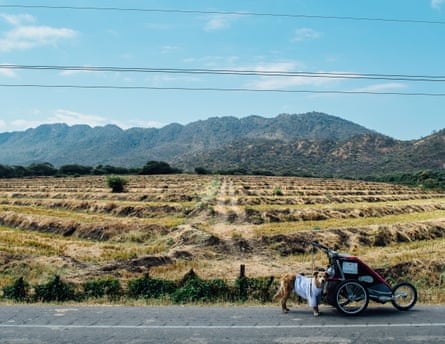
Since returning to the US, Turcich admits he has found it tough adapting back to regular society. Although part of the reason he left was because he didn’t want to bow down to the conventions of nine-to-five work, he found that the walking provided him with a different kind of routine he has found impossible to replace. “One of the best things about the walk was every day I woke up with a purpose. A very immediate purpose and human purpose where I walked a certain amount. So every day I’d accomplish the little goal and within that I’d see new things, talk to new people, learn about the world, just through walking. Then I’d lie in bed, thinking: ‘That was a good day, mission accomplished, let’s do it again tomorrow.’ And now the walk’s over, you don’t have that innate sense of discovery. So it feels like I’m building a life from the ground up again here in Seattle.”
He is certainly better equipped to deal with life than the 25-year-old greenhorn setting out on his walk. Turcich, now 33, has languages, knowledge, practical skills, friends across the world. Over the years, he picked up 121,000 followers on Instagram as he documented his travels under the handle @theworldwalk. The day we spoke, he signed a book deal to tell the story of his walk. And there are the talking engagements. People love to hear his story about how the loss of his great friend Ann Marie sent him around the world to search for meaning in life.
When I ask if he found what he was looking for, he takes me back to that night under the stars in the Atacama, and the sense of his smallness in the universe. It made him feel insignificant but also feel that he could make a difference, albeit in little ways. “I came to the conclusion that it’s happiness. Happiness is the only currency for man. You try to be happy and try to create happiness. Happiness can mean a lot of different things and take a lot of different forms. But if you make the world a better place, you can leave behind gross happiness for your descendants.”
As for himself, he still finds it difficult to believe how much his travels have changed him. Nowadays timid Tom Turcich will happily stand in front of a paying audience and tell people what he discovered about the world by walking its surface. Before he embarked on his odyssey, he didn’t believe he had anything worth telling anybody. But now he thinks differently – in every sense. “When you walk around the world for seven years you learn a lot,” he says.

